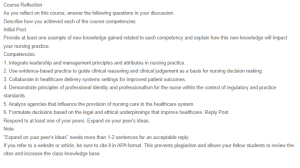Discussion – Essentials of Leadership and Management in Nursing
In this paper, I aim to appreciate how the competencies garnered through the study of this cause have contributed to my career development and practice as a nurse. Outlined below are the competencies I achieved, examples of the new knowledge gained, and how this knowledge impacts my professional practice (Wang & Jiang, 2024).
To begin with, the competency to integrate leadership and management principles and attributes in nursing, where I learned about how crucial effective leadership and management principles are to the nursing practice. The new knowledge gained revolves around a transformational leadership style that states the importance of staff motivation to achieve their full potential. This knowledge is significant to my practice, where I will lead by example by fostering professional development and ensuring motivation through recognition and appreciation of their strengths (Iqbal et al., 2020).
The use of evidence in clinical reasoning and clinical judgment is another competency learned in this course. I took away the knowledge to use clinical guidelines to inform my nursing interventions. This has influenced my decision-making by ensuring informed decisions are made based on the latest best available evidence that has positively influenced the overall patient outcomes. Thirdly, I learned about the importance of inter-professional collaboration, where a key takeaway was the understanding of the collaborative models for nurses to collaborate with other disciplines to come up with a comprehensive plan of action that holistically addresses the needs of the patients. This remains significant to the nursing practice due to fostering patient satisfaction and ensuring complete and holistic care is delivered. Fourthly, concerning the competency of professional identity and professionalism in nursing, I learned new knowledge on the importance of upholding ethical standards and being up to date with policy changes, which is important since they foster professional competence. The fifth competency learned revolves around the various agencies influencing nursing care in health systems. I learned new knowledge of how these agencies set regulations to ensure the quality and safety of patient care. This knowledge remains significant to my practice as I and my colleagues will uphold these standards in care delivery. Lastly, I learned the competence to formulate decisions based on the legal and ethical provisions as emphasized by the course about the various components of legal and ethical provisions such as informed consent and patient rights. New knowledge gained was how to navigate around ethical dilemmas that remain significant to the practice. As supported by Wang & Jiang (2024), ethical dilemmas are well addressed through approaches based on a solid ethical foundation that helps evade breaches of legal provisions.
References
Iqbal, K., Fatima, T., & Naveed, M. (2020). The Impact of Transformational Leadership on Nurses’ Organizational Commitment: A Multiple Mediation Model. European Journal of Investigation in Health, Psychology and Education, 10(1), 262–275. https://www.ncbi.nlm.nih.gov/pmc/articles/PMC8314220/
Wang, H., & Jiang, X. (2024). Nursing Leadership: Key Element of Professional Development. International Journal of Nursing Sciences, 11(1). https://doi.org/10.1016/j.ijnss.2023.12.015
ORDER A PLAGIARISM-FREE PAPER HERE
We’ll write everything from scratch
Question

Discussion – Essentials of Leadership and Management in Nursing
Course Reflection
As you reflect on this course, answer the following questions in your discussion.
Describe how you achieved each of the course competencies.
Initial Post
Provide at least one example of new knowledge gained related to each competency and explain how this new knowledge will impact your nursing practice.
Competencies:
1. Integrate leadership and management principles and attributes in nursing practice.
2. Use evidence-based practice to guide clinical reasoning and clinical judgement as a basis for nursing decision making.
3. Collaborate in healthcare delivery systems settings for improved patient outcomes.
4. Demonstrate principles of professional identity and professionalism for the nurse within the context of regulatory and practice standards.
5. Analyze agencies that influence the provision of nursing care in the healthcare system.
6. Formulate decisions based on the legal and ethical underpinnings that improve healthcare. Reply Post
Respond to at least one of your peers. Expand on your peer’s ideas.
Note:
“Expand on your peer’s ideas” needs more than 1-2 sentences for an acceptable reply.
If you refer to a website or article, be sure to cite it in APA format. This prevents plagiarism and allows your fellow students to review the cites and increase the class knowledge base.

